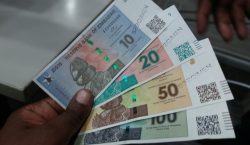

The blueprint lays out the macroeconomic base for the 2010-2012 national budgets, Finance Minister, Tendai Biti, said, indicating the policy framework would also serve as an interim macro-plan transiting the Short Term Emergency Recovery Programme (STERP) into the Mid-Term Plan (MTP).
The MPT, covering the financial period, 2010 to 2015, is currently being developed to replace STERP, an 11-month stabilisation policy, which expired in December last year, having achieved less than a quarter of its set targets due to financing challenges.
“The three-year macroe-conomic policy and budget framework will lay out the macroeconomic policy instruments that will anchor the rolling budget for the years 2010-2012, while the MTP will deal with the broad developmental and growth oriented policies,” Biti said. “The framework therefore bridges the gap between STERP the MTP, which is under formulation.”
The framework — also dubbed STERP II — forecasts the rate of growth in the economy will rise to seven percent this year from a revised 4,7 percent last year, but decelerate to a steady-state of 6,3 percent in 2011 and 2012.
These estimates represent a huge adjustment to earlier projections, announced by the fiscal authorities and espoused in the draft MTP, that the economy would post robust growth as from this year, reaching 12 percent in 2011 and steadying at around 15 percent as from 2013.
The International Monetary Fund insists the projections are somewhat wayward given the fragility of Zimbabwe’s economy and its critical funding crisis, and instead brought the forecast down to a modest 3,7 percent this year.
Technically allocation-focused in nature due to revenue constraints with no defined instrument for economic stimulation, the rolling budgets hardly support the government’s vision to achieve a quick progression from stabilisation to growth.
The anticipated slowdown in economic recovery sharply contrasts with the high inflation rate expectations, which Biti, attributed to high energy costs and increased spending.
According to the macro-policy and budget framework, the annual rate of inflation will climb to 5,1 percent this year, further surging to 7,7 percent in 2011 and 7,8 percent in 2012.
The three-year plan also targets increasing the ratio of national savings and investment to gross domestic product (GDP) from under 10 percent at present to 14,3 percent in 2010 and 23,8 percent in 2011 and 2012.
The proportion of exports of goods and services to GDP is also seen rising marginally to 36,5 percent in 2010, moving upwards by 1,5 percentage points in 2011 and by a similar magnitude in a year.
The framework also aims to deal with a broad range of economic and economy-related issues such as food security, restoration of basic services, promotion of regional integration, employment creation, investment attraction, confidence building, restoration of basic freedoms and restoration of international relations.
Sorry. No data so far.

